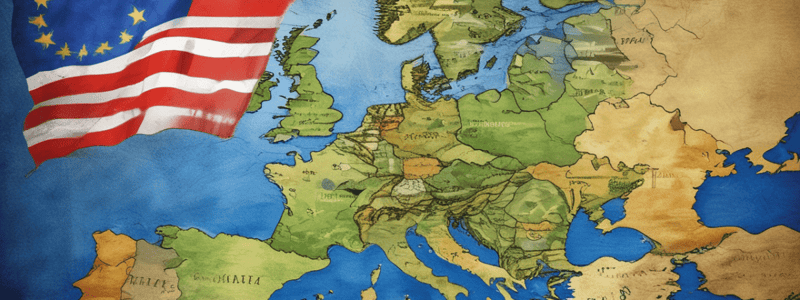Podcast
Questions and Answers
Which countries signed the Treaty of Rome in 1957?
Which countries signed the Treaty of Rome in 1957?
- Seven European countries
- Six European countries (correct)
- Five European countries
- Eight European countries
What was the main goal of the European Economic Community (EEC) established by the Treaty of Rome?
What was the main goal of the European Economic Community (EEC) established by the Treaty of Rome?
- Creating a European army
- Promoting economic integration (correct)
- Establishing a common foreign policy
- Promoting political integration
Which treaty introduced the concept of a single currency (euro) in the European Union?
Which treaty introduced the concept of a single currency (euro) in the European Union?
- Treaty of Amsterdam
- Maastricht Treaty (correct)
- Treaty of Rome
- Treaty of Lisbon
What are the three pillars of the European Union established by the Maastricht Treaty?
What are the three pillars of the European Union established by the Maastricht Treaty?
Which year did the European Union experience its largest wave of enlargement?
Which year did the European Union experience its largest wave of enlargement?
What was the outcome of the United Kingdom's referendum on EU membership in 2016?
What was the outcome of the United Kingdom's referendum on EU membership in 2016?
What is the name of the process by which the United Kingdom withdrew from the European Union?
What is the name of the process by which the United Kingdom withdrew from the European Union?
Which EU institution has legislative and budgetary powers?
Which EU institution has legislative and budgetary powers?
What is the role of the European Commission in the European Union?
What is the role of the European Commission in the European Union?
Which EU institution ensures the correct interpretation and application of EU law?
Which EU institution ensures the correct interpretation and application of EU law?
Flashcards are hidden until you start studying
Study Notes
European Union History
Treaty of Rome (1957)
- Signed on March 25, 1957, by six European countries: Belgium, France, Germany, Italy, Luxembourg, and the Netherlands
- Created the European Economic Community (EEC), aimed at promoting economic integration among member states
- Established the European Commission, Council of Ministers, and European Parliament
- Laid the foundation for a single market and customs union
Maastricht Treaty (1992)
- Signed on February 7, 1992, in Maastricht, Netherlands
- Created the European Union (EU) and introduced the concept of a single currency (euro)
- Established the three pillars of the EU:
- European Community (EC)
- Common Foreign and Security Policy (CFSP)
- Cooperation in the Fields of Justice and Home Affairs (JHA)
- Introduced the concept of European citizenship and cooperation in areas like defense, asylum, and immigration
Enlargement of the EU
- The EU has undergone several waves of enlargement since its inception
- Key enlargements:
- 1973: Denmark, UK, and Ireland joined
- 1981: Greece joined
- 1986: Spain and Portugal joined
- 1995: Austria, Finland, and Sweden joined
- 2004: 10 Central and Eastern European countries joined (A10)
- 2007: Bulgaria and Romania joined
- 2013: Croatia joined
- Enlargement has led to increased diversity and economic growth, but also challenges in integrating new members
Brexit
- The United Kingdom (UK) held a referendum on June 23, 2016, in which a majority voted to leave the EU (51.9% to 48.1%)
- The UK triggered Article 50 on March 29, 2017, beginning the withdrawal process
- The UK officially left the EU on January 31, 2020, entering a transition period that ended on December 31, 2020
- The consequences of Brexit are still unfolding, with implications for trade, migration, and EU-UK relations
EU Institutions
- European Parliament: directly elected by EU citizens, it has legislative and budgetary powers
- European Commission: the executive branch, responsible for proposing and implementing EU policies
- Council of the European Union: represents the member states, and adopts EU laws and policies
- European Council: composed of EU heads of state or government, it sets the EU's overall direction and priorities
- European Court of Justice: ensures the correct interpretation and application of EU law
Studying That Suits You
Use AI to generate personalized quizzes and flashcards to suit your learning preferences.



